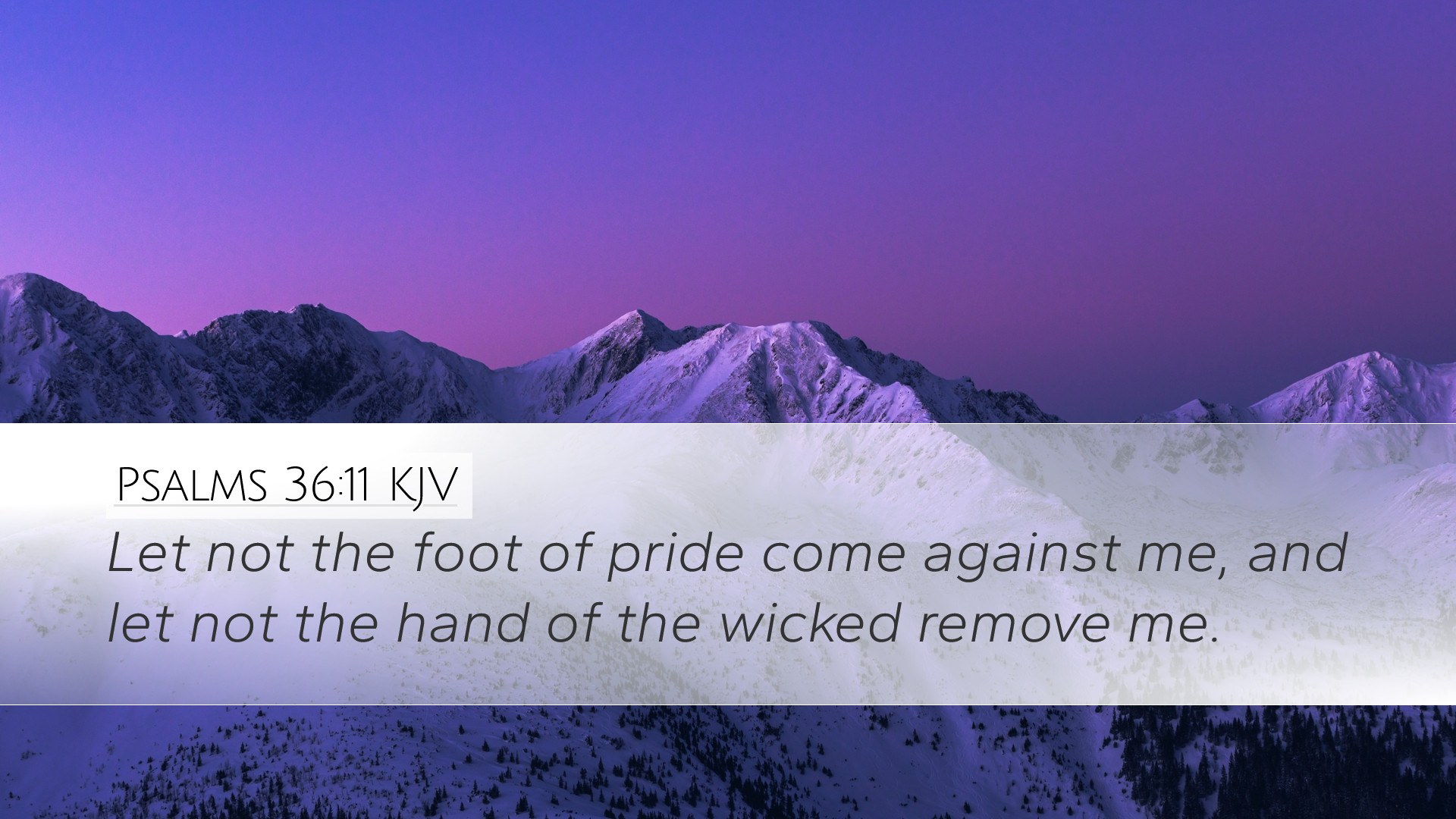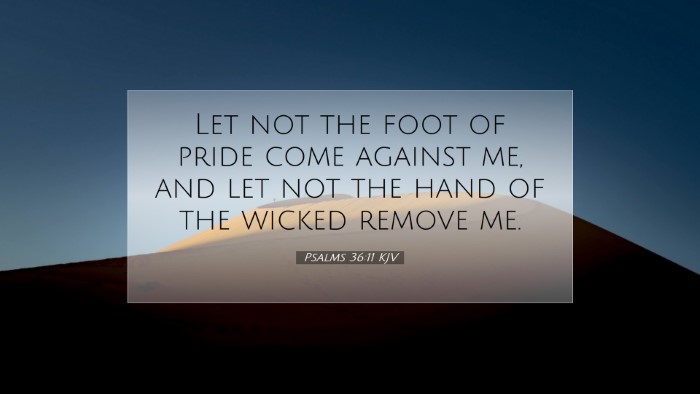Commentary on Psalms 36:11
Verse (Psalms 36:11): "Let not the foot of pride come against me, and let not the hand of the wicked remove me."
Introduction
This verse presents a heartfelt plea for protection against the forces of pride and wickedness. It encapsulates the psalmist's vulnerability in the face of oppression and sin, expressing a profound reliance on God for safeguarding from moral and spiritual dangers.
Contextual Analysis
The context of Psalm 36 reveals a stark contrast between the character and conduct of the wicked and the righteousness that God provides. Throughout the psalm, the psalmist reflects on the nature of divine love and the implications of human pride. This verse specifically calls upon God's strength to counter the threats posed by arrogant and evil individuals.
Matthew Henry's Commentary
Matthew Henry highlights the duality of the threats described in this verse. He emphasizes that the "foot of pride" symbolizes the aggressive advances of those who exalt themselves. Pride is considered a precursor to sin, often leading individuals to act without regard for the divine order. Henry notes, "Pride seeks to trample the humble underfoot; thus, the righteous must constantly seek God’s protection."
Albert Barnes' Insight
Albert Barnes provides further theological reflections on this verse, portraying the "hand of the wicked" as a metaphor for the tangible actions taken by those who delight in wrongdoing. He writes, "The wicked are often depicted as actively working to undermine the faithful. The psalmist's request reveals the communal nature of spiritual struggles, reinforcing that such battles are fought not merely in isolation but within a broader spiritual context."
Adam Clarke's Interpretation
Adam Clarke's commentary delves into the implications of the psalmist's cry for help. He surmises that this verse serves as a reminder of the constant danger posed by both internal and external threats to faith. Clarke notes, "The psalmist's plea encapsulates a deep awareness of the reality of spiritual warfare and the necessity of divine intervention." He suggests that the acknowledgment of pride and wickedness is crucial for spiritual vigilance.
Thematic Exploration
The verse can be explored through several thematic lenses:
- Pride: The foot of pride represents arrogance and self-exaltation, which often leads to oppression and injustice.
- Wickedness: The hand of the wicked symbolizes the actions of those who reject God’s commandments, facilitating harm against others.
- Divine Protection: This plea for protection underscores the psalmist's reliance on God as a fortress against evil.
Theological Implications
Theological reflections on this verse lead us to consider the nature of God as benevolent protector. The recognition of pride and wickedness within society necessitates a call to action for believers. Both Matthew Henry and Albert Barnes remind readers that humility before God is vital, serving as the antidote to pride.
Humility as a Virtue
Throughout Scripture, humility is lifted as a necessary stance before God. Psalms and Proverbs reiterate the blessings afforded to the humble. Therefore, the psalmist here models appropriate spiritual posture—bringing oneself under God’s authority while seeking shelter from pride and evil.
Justice and Righteousness
The ongoing struggle between good and evil is a foundational theme in Scripture. The understanding that humans will often choose pride and wickedness emphasizes the importance of cultivating justice and righteousness within communities. Pastors and theologians are urged to keep these virtues at the forefront of teaching and discipleship.
Application for Believers
As believers reflect on Psalms 36:11, various applications emerge. Here are relevant considerations for pastors and students of the Word:
- Self-Examination: Believers should consistently evaluate their hearts for pride and ensure they are living in humility before God.
- Community Vulnerability: Engage in community discussions addressing the influence of wickedness and how they might support vulnerable individuals.
- Empowerment through Prayer: Recognize the power of intercessory prayer, pleading with God for protection against pride and wickedness.
Conclusion
Psalms 36:11 serves as a poignant reminder of the ongoing spiritual battle believers face against pride and wickedness. Through the insights of Matthew Henry, Albert Barnes, and Adam Clarke, we are encouraged to seek God's protection, acknowledge our weaknesses, and walk in humility. This scripture calls upon the faith community to strive for righteousness and lean on the divine strength that secures us against evil.


